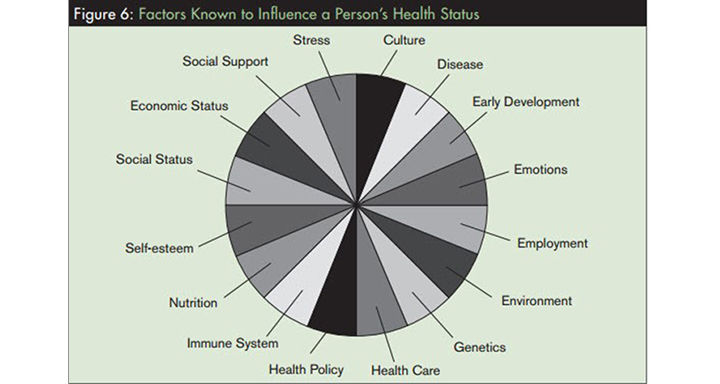Look at the whole picture for root causes of disease
10 years ago | Proactive Health
By pH health care professionals
Our current health care system has sometimes been criticized for addressing the symptoms of various diseases as opposed to treating the root cause. And many bright minds have tried to find root causes of diseases since the beginning of time. While many brilliant discoveries have been made, root causes of diseases are often multifold and complex, and what exactly the root cause is may vary, depending on who you ask!
If you have a heart condition, a cardiologist may utilize procedures involving catheters and stents in your heart to address the cause of your problems and improve blood flow. The internist will tell you that you have too many cardiac risk factors, that your blood pressure and cholesterol are too high and that your diabetes needs to be better controlled. The nutritionist will teach you how to eat more balanced meals instead of the junk food that’s causing your weight issues. An alternative practitioner might recommend chelation therapy to dissolve calcium in your blocked arteries, while the acupuncturist will tell you that your yin and yang are out of balance. The list goes on. Each practitioner specializes in his or her own particular area and gets paid for his or her specific type of service. So as health care consumers, let us try to take a step back and look at the big picture. Let’s take an objective look at “root causes,” and determine the factors that may be contributing to our health problems.
This chart by Humana provides a starting point, highlighting some of the key factors that are known to influence a person’s health:

Chart: Humana Corporate
Our pH health care professionals have also compiled a list of common root causes of disease:
- Lack of knowledge: Many diseases can potentially be prevented if people know better and act on this knowledge. The general public’s lack of education about how to stay healthy is a root cause for many diseases. For example, the overall impact of vaccines have saved many more lives compared to the side effects. And many teenagers are still not properly informed about sexual disease prevention.
- Your economic status: Lack of access to adequate health care is a root cause for disease and impacts overall health and longevity.
- Your relationships and social networks: Your health outcomes will be better for various reasons if you have strong relationships and networks. On the other hand, unhealthy relationships or lack of relationships may contribute to disease development and progression.
- Your work: Spending a significant part of your waking life at work will naturally increase some work-related health risks such as unhealthy stress levels, long work hours/inadequate rest, lack of physical activity, excess risk due to hazardous activities, high blood pressure, indoor air pollution, lack of sunlight exposure and greater likelihood for unhealthy fast food choices.
- Your home: There may be a multitude of issues at home, which can range from indoor air pollutants such as volatile organic matter, furniture varnish, carpets, cleaning fumes, radon, mold, asbestos, gas leaks, carbon monoxide from old furnaces, lead paint or plumbing, noise pollution, electric or other safety hazards. Also, disease can spread in crammed living spaces.
- Genes: One way to determine genetic problems is simply to look at the health status of your parents, grandparents and siblings. Laboratory genetic testing is evolving rapidly to not only address specific genetic malformations, but also heart disease and cancer risk, nutritional defects and much more. Read about how whole genome testing at Proactive Health Labs is leading the way in personalized medicine.
- Activity level: A sedentary lifestyle is a major risk factor for disease and disability, according to the World Health Organization. Regular physical activity level improves circulation, energy levels and your immune system.
- Food habits: Quality of food is the key, ensuring you are getting the proper essential nutrients and not eating excessively. Many diseases are associated with various nutritional deficiencies, and in reverse, many deficiencies can cause development or worsening of disease. Too much acidity interferes with optimal cell functions and health.
- Risky behaviors and accidents: Sexual risk-taking can have long-term adverse health effects such as HIV, chronic inflammation, pelvic disease, cancer, chronic infections, infertility, transfer of diseases and others. Recreational and prescription drug abuse can cause dependencies and even lethal side effects (e.g. respiratory failure in narcotic overdose).
- Toxins: Given the fact that you might be exposed to hundreds of different chemicals every day, you should make an effort to learn how to reduce your exposure to unhealthy chemicals, such as pesticides. That means reading labels and buying organic and non-toxic products. Fortunately, lab technology has advanced to where testing for heavy metals and certain toxins can be done at a cost-effective level.
Enjoy Your Healthy Life!
The pH professional health care team includes recognized experts from a variety of health care and related disciplines, including physicians, attorneys, nutritionists, nurses and certified fitness instructors. This team also includes the members of the pH Medical Advisory Board, which constantly monitors all pH programs, products and services. To learn more about the pH Medical Advisory Board, click here.



